
SEO Tips for Real Estate Agents
How to Use SEO to generate real estate clients:

How to Use SEO to generate real estate clients:

Jacqueline Kyo Thomas
You've heard of SEO. You’ve also heard that SEO is important, but you don't really understand it and have no clue why it's necessary. You're not alone. A lot of real estate agents don't understand SEO and the role that it plays in generating new clients. In this post, we’re breaking it all down. We’ll cover everything you need to know, from SEO basics to tips on how to use SEO to grow your real estate business.
Let’s get started.
SEO stands for search engine optimization.
SEO is a list of things you can do on your website (and off) to make it more attractive to search engines like Google, Bing, Yahoo!, DuckDuckGo, et al.
For the sake of simplicity, we’re just going to focus on one search engine: Google.
Google is the largest, most popular, and most powerful search engine on the Internet. Although Google is a noun, it’s also morphed into a verb that describes how we search the Internet. We google something.
(But remember, we’ll use Google as the catch-all. Feel free to substitute your favorite search engine here because they work similarly.)
Optimizing your website for search engines is important because there are millions of websites currently online. Search engines have to search through millions of websites to determine which results will show for each query. By optimizing your website for search engines, you’re helping these search engines see the benefit of your website. When your website is optimized, Google won’t need to guess that your website will provide the answers to a user’s search. Google will know, based on your level of optimization, that your website is the right choice. Ultimately, the goal is to increase your page’s ranking in search results.
Still scratching your head?
Stick with me.
It’s easiest to think of Google as a librarian. When you search for something, you’re asking the librarian to help you locate a “book.”
The library has a huge selection of books. The more information you can provide the librarian, the better. This will narrow down the amount of books that the librarian brings to you. And it will also ensure that the books the librarian brings out are relevant.
But imagine you were the author of one of those books. To increase your chances of getting pulled for a relevant query, you would make it easy for the librarian to understand what your book is about. You would provide information that the librarian would use to better categorize your book.
So, the internet is a huge library. Google is a librarian. Your website is a book.
When people search Google, they use keywords. These keywords help Google, the librarian, narrow down where in the library to look.
Google has a complicated organization system that none of us outsiders fully understand (move over, Dewey Decimal). But Google has provided us with tips on how we can optimize our websites to align with their organizational system. We’ll discuss how to optimize your website for Google later in this guide.
Most house hunters start their search for a new home online. They may search with the keywords “realtors in cambridge ma.”
Google springs to action and shows relevant results. Let’s break down what a Google user is likely to see in a search engine results page (SERP) for that query.
At the top of SERPs will be a list of Google-screened agents. These are sponsored (i.e. paid) ads.
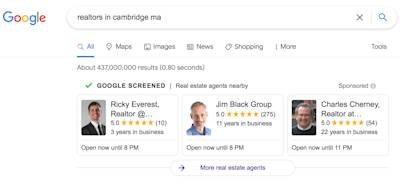
Next, you’ll see local listings and a Google map of agents in the area.
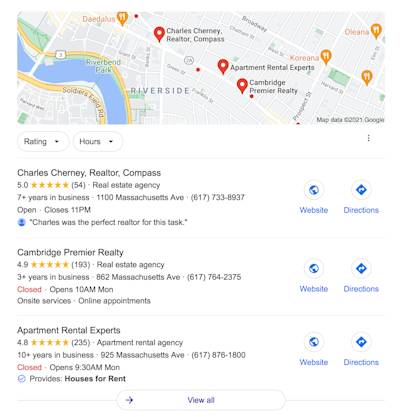
Next, you’ll find 10 organic listings. In other words, they’re not paying a fee to appear on the SERP.
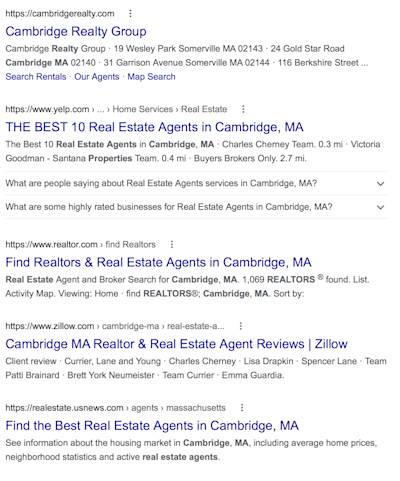
Nestled within the organic listings is a list of questions that are related to the query.
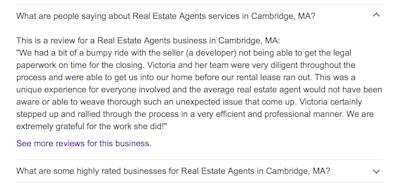
Finally, at the bottom of the page, you’ll find related searches.
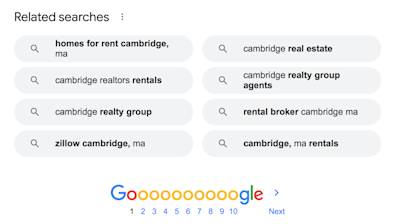
Google’s SERP is pretty simple, but there are a lot of different components that you must be mindful of.
First: You can make it to the top of the search engine results page by paying for a pay per click (PPC) ad. Learn more about PPC ads here.
Second: You can show up in the local listings section and the organic section. Only 3 local listings are shown. This is known as the “snack pack.” However, users can click “View all” to see an expanded list.
Third: By default, Google shows 10 organic listings per page. It’s important to note that most people never click beyond page 1. So, Google has included related searches to help users further narrow their search.
It is possible to show up in 3 or more spots on the search engine results page. Take a look at Charles Cherney. He shows up at the top of the page (paid listings), in the local listings, in both Yelp and Zillow, and also in his own website. That’s 6 times!
By optimizing your presence online, you too can dominate the search engine results.
So, we’ve briefly touched on this, but let’s dive in. There’s a difference between traditional SEO and local SEO.
Traditional SEO includes all of the things you do on your website to improve its visibility on a national or global scale. For example, let’s say you want to position yourself as a real estate authority and thought leader, and so you write an amazing and definitive blog post on how to sell a home in a buyer’s market. Because that topic is not necessarily tied to a local market, you can draw traffic from all over the globe. You would use traditional SEO practices to increase your chances of showing up when someone searched for that topic—regardless of their location.
Local SEO is everything you do on your website to increase your visibility for local searches. For example, if someone searches for a real estate agent, Google automatically pulls results that are local to that user. After all, a house hunter in Cambridge doesn’t need to see agents from Kalamazoo. Google knows this and will show agents in the appropriate location.
Now that we’ve discussed what SEO is and how it can benefit you, let’s dive into how to create your own SEO strategy.
Start simply and then build into the more complicated tactics as you gain confidence. Here are the most important things you can do to optimize your website for search engines now:
Google loves fresh content. Having a blog will allow you to constantly churn out new content. Plus, it gives you more opportunities to get found through searches. Find relevant keywords that people are currently searching for (Google Trends is a good place to start). Then, build your content strategy around that. Aim to create two to four 1,000+ word blog posts each month.
Also, when using keywords in your posts, be sure that you’re complying with Fair Housing Laws. For example, you can’t use terms like, “family-friendly neighborhood” or any phrase that may be discriminatory against a protected group. Check out this post for more guidance on the Fair Housing Act and responsible advertising.
Once you’ve built up a library of content (with 10+ posts), start linking to your posts. Internal linking helps Google understand your site’s content and architecture. You can also link to posts outside of your website. This will help Google learn about you, based on your associations.
NAP stands for name, address, and phone number. Google will use this information to decide if and when to show your listing on local searches. Add your NAP to every page on your website. It’s easiest to do this on the header or footer of your website.
We provide an in-depth post on Google My Business here. Google My Business is a free tool provided by Google that allows you to show up in local searches and on Google Maps. Be sure that your name, address, and phone number are the same on Google My Business as on your website.
Don’t just claim your listing and forget about it. Get active on Google My Business. Encourage people to leave reviews, and respond to those who do. Add content, including short posts and videos to your listings.
Whew! That was a lot to cover, but hopefully, you now have a better understanding of how SEO works.